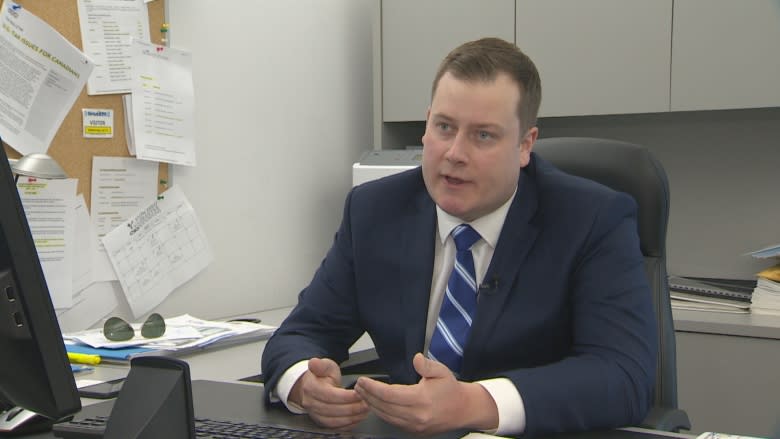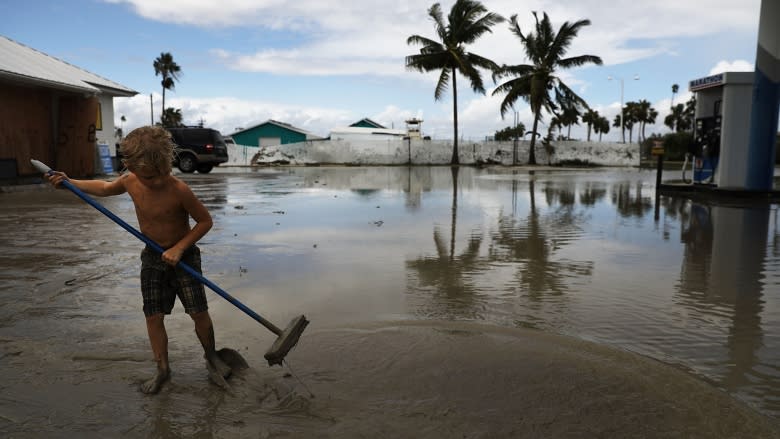For Canadians owning property in Florida, assessing the damage after Hurricane Irma is full of challenges
Many Canadians who own property in Florida are taking on the difficult task of assessing the damage left behind by Hurricane Irma from as much as 2,000 kilometres away in Canada.
As the remnants of the storm churn towards the northeast U.S., the cleanup in most of Florida is just beginning. For some, that cleanup means cleaning up broken branches and downed palm trees — others are faced with complete and utter devastation.
And there is yet another group — homeowners who have no idea what damage the ferocious storm did to their residences. Many of those are Canadian snowbirds.
"It was like a bulls-eye was painted on our house," said Doug Bingley, an east-end resident of Toronto, who owns a home in Collier County, just outside Naples, near the gulf coast of Florida.
Bingley and his wife Patsy have been unable to get information about the extent of the damage — if any — to their second home. That has left them wondering "how much damage is going to be there, and whether the friends that you've made down there … how are they going to survive?" Patsy Bingley said.
"It's a lot of stress when you're away, and you can't get all the information."
Located on an inlet and near a large quarry about three miles from the coast, the Bingleys' home was expected to have storm surges of nine feet. And with the street only three feet above sea level and the home having nine-foot ceilings, that surge would "destroy the home," explained Doug Bingley. "Maybe it's just as well we don't see it," he quipped.
In 2015, more than 500,000 Canadians owned property in Florida, according to a Bank of Montreal survey. About 70,000 of them are registered with the Canadian Snowbird Association (CSA) — many of whom have been calling their association after the storm for answers.
"They're getting first-hand reports from friends in the community," said Evan Rachkovsky, director of research and communications for the CSA, about the calls they've been getting. "The first thing we're telling people is to heed the advice from local officials."
He cites the website floridadisaster.org, where the local government is updating information about what counties people can and can't return to.
"You just want to get on a plane and go there. Of course, no plane will take you there, and if you got there, there would be no food, no electricity and probably no rental car," Doug Bingley said, adding that they've been unable to make contact with friends or other locals in their neighbourhood.
According to Rachkovsky at the CSA, another big concern for members, aside from the damage to their homes, is the immigration issue.
Canadians can be in the U.S. for six months, less a day, within a 12 month period, he explained. Some members are close to that limit and if they chose to visit their properties to assess damage, they may go over that limit.
That being said, Rachkovsky added that "generally in my experience, [U.S. customs officers] are very sympathetic in these types of natural disaster situations," adding that it's always up to the discretion of the officers whether or not snowbirds are allowed into the country.
An added challenge for Canadian property owners in Florida is dealing with insurance. The Bingleys have a deductible of about $15,000 on their property for hurricane damage, something that is quite common, explained Rachkovsky.
"It's very difficult to get private insurance, especially for properties along the coast," he said, adding that deductibles can be very high.
In addition to hurricane insurance, flood insurance had to be purchased separately.
"When a hurricane comes in, you hope it just takes the top off your house … because if it floods, you're toast," Doug Bingley said.
For the Bingleys, knowing the extent of the damage is just a guessing game at this point.
"I fully expect [the pool cage] to be gone," said Patsy Bingley — that alone costs about $15,000. She also thinks they might have lost a large number of shingles. Luckily, they installed hurricane shutters on the windows recently — but their garage door, which was not hurricane proof, was still vulnerable.
Once the damage is assessed, the next challenge is finding contractors and supplies to repair the damage, something Doug Bingley says is even more difficult if you don't live there full-time.




